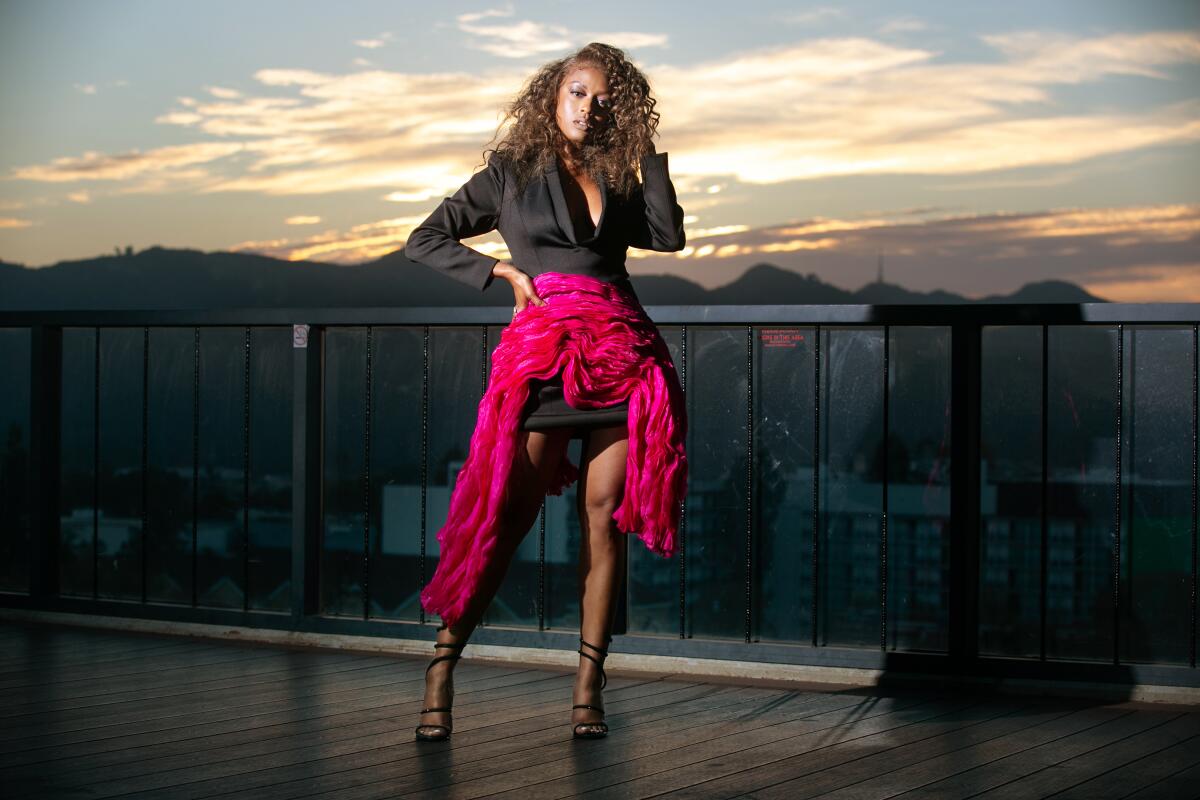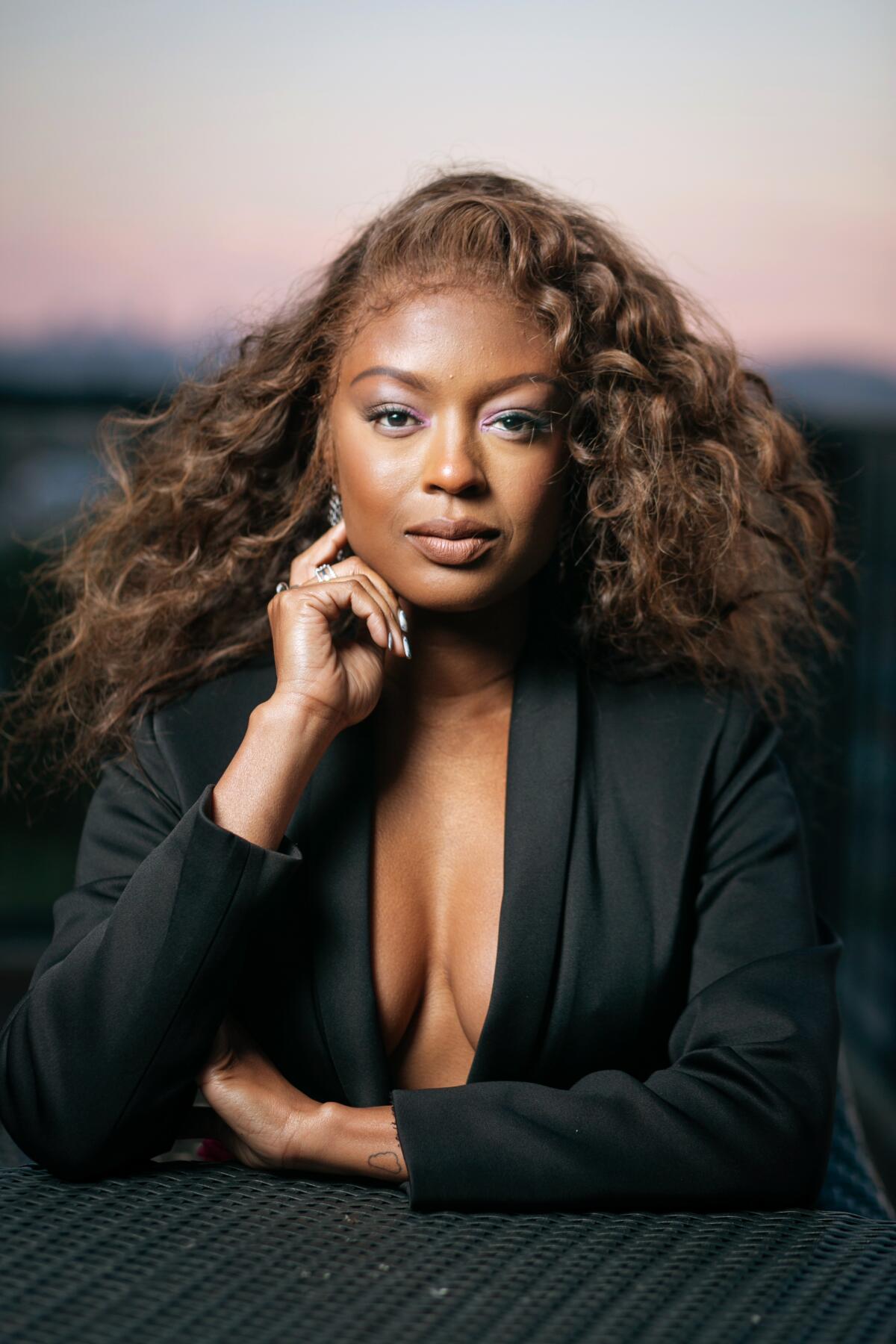Javicia Leslie left government for Hollywood. Now she’s the first Black Batwoman

Javicia Leslie is a plant person.
It’s just one of the things she has in common with Ryan Wilder, the new lead character she portrays in The CW’s “Batwoman,” who takes the mantle as Gotham’s caped vigilante during the show’s second season, which premieres Jan. 17.
And because she’s a plant person, she had an important question about Ryan’s backstory when she accepted the “Batwoman” role: Who took care of Ryan’s plant while she was away?
“Ryan got her plant when she was technically an older teenager, young adult,” Leslie says during a late December video call. “But then I go to prison for 18 months. Where was my plant? That mattered to me.”
Even if it’s never addressed in the show, “It matters because for a plant to be that important to me,” she says, “obviously, whoever I had take care of it is a person important to me.”
It’s a detail that even showrunner Caroline Dries hadn’t considered — but Leslie, 33, explains that as an actor, “You want to know why you’re doing what you’re doing. You don’t want to just do it.”
These are the types of details Leslie focuses on while she does the work of inhabiting the world of her character. It’s only in moments when she steps away that she is reminded about the historic nature of her new role.
Mainstream fantasy TV often depicts white characters in white worlds. “His Dark Materials” and “Bridgerton” are among the shows trying to change that.
Leslie was announced as the new “Batwoman” in July after the show’s original star, Ruby Rose, exited the series after one season. The series had already broken ground as the first superhero series with a lesbian title character when it premiered in 2019. Leslie’s casting makes her the first Black actress to portray Batwoman in any live-action production.
“I’m constantly reminded about what this means to so many people and how this has really nothing to do with me and everything to do with what putting on that suit means,” Leslie says. “The first time I put the suit on, I immediately felt an immense amount of responsibility to save the world. Me, Javicia. Not even me as Ryan.”
And she understands that by her putting on the suit, “Someone will be impacted and someone will feel represented and someone will feel more powerful.”
Like Kate Kane, the show’s original Batwoman, Leslie’s character is a lesbian, but that’s where most of their similarities end. When Ryan is introduced, she lives in her van with her plant. She has a criminal record, which means job prospects have been slim. In many aspects, Ryan is Kate’s opposite.
For Dries, who had to come up with a story arc that wouldn’t alienate fans for the show’s second season, Leslie’s casting “felt like kismet.”
“Javicia came in [to her audition] … and she just hit every note the way I had it in my head,” Dries says. “She hit the comedy beats, she hit the emotional scenes, she had swagger, she had vulnerability, she had fun. I wanted to infuse a lot of fun into this character, because I wanted to create somebody who’s a little bit more aspirational.”
It’s easy to see how Leslie captured Dries and casting director David Rapaport’s attention — even over a video call she’s engaging, thoughtful and funny.
Berlanti Productions’ Greg Berlanti and Sarah Schechter, executive producers on “Batwoman,” were already familiar with Leslie from her work on their CBS show “God Friended Me.” Leslie’s also had roles on “MacGyver” and “The Family Business” and in the 2019 rom-com “Always a Bridesmaid.”
‘How do you discuss this when Jenny is white?’ Ayo Edebiri says of her character’s Blackness. ‘What do you do about it?’ Season 4 is the answer.

Although she was always interested in acting and the arts, these interests were considered a hobby and not a viable career. For her mother, whom Leslie describes as very supportive and her real-life hero, it was important that her daughter pursue something that could more reliably pay the bills. So after graduating from Hampton University, Leslie got a job working for the government in Washington, D.C.
“The entire time,” Leslie says, “all I could think was, ‘This isn’t me.’ ... This is not what I wanted to do. I’m not a 9-to-5 kind of person. I feel stifled. I feel small.”
So after her two-year contract was up at her job, she packed up and left D.C. in January 2012. A couple of months later she was in L.A.
Leslie cites Black characters on Saturday morning cartoons as among the earliest she could relate to on television. She also mentions Eartha Kitt as Catwoman in the 1960s “Batman” series and Halle Berry as Storm in the “X-Men” film series as inspiration.
“That’s when I knew that we could be in that world and be beautiful and be powerful and be impactful,” Leslie says, “and also become the icon for that character.”
While she grew up watching the Michael Keaton “Batman” films, Leslie says Christian Bale’s incarnation of the character was more influential to her. She credits Heath Ledger’s Oscar-winning performance as the Joker in “The Dark Knight” as one of the reasons.
“With Christian Bale, I was older, so I was able to understand acting and what it meant to become these characters,” she says.
Leslie was drawn to “Batwoman’s” Ryan, a character created for the show, because of her flaws, which made her “very human.”
“I think that there’s almost this idea that superheroes are supposed to be perfect,” Leslie says. “They all have something in their past that they struggle with, but you see them as these bright lights. Ryan, she was more impacted by the things that happened in her life, so she carries that weight, and I think that that’s something that I connected with her.”
Dries says she considered options such as recasting Kate Kane or finding an existing DC character who could shift into the Batwoman role before choosing to move forward with an original character.
“I think some TV shows can get away with [recasting], but for us, it felt a little wonky,” Dries says. “So I decided, let’s continue the storyline but let’s introduce this new character who takes on the mantle of Batwoman, and maintain Kate Kane’s legacy on the show and create a mystery around where she went and lean into the challenge.”
Ruby Rose, who plays the titular vigilante in “Batwoman,” has left the CW superhero series ahead of its second season.
It was after casting Leslie that certain elements of the character’s backstory were changed. For example, early descriptions of the character mentioned Ryan’s past as a drug runner.
“Once we cast Javicia I wanted to restructure some of the stuff in her past to make sure we’re telling a really authentic and positive story,” Dries says. “Putting something good out there that doesn’t feel trope-y or like something we’ve seen before.”
Additionally, casting a new Batwoman meant opportunities to pursue storylines that didn’t work in a show about Kate Kane, such as a critical look at the Crows, the private security firm run by Kate’s father in order to protect Gotham in their own way.
“The Crows are basically this growing fascist organization that has no accountability in the city,” Dries says. “They were built for rich people and don’t care about poor people. While we know some of the Crows that are good people, the institution as a whole is flawed. And I struggled to have Kate have a strong point of view about that because it wasn’t really her drama.”
Ryan, on the other hand, has a history with the Crows, so she can take a critical stance. Dries even describes the Crows as one of Ryan’s nemeses this season.
Leslie appreciates how the series tackles real-life issues with nuance while still being a fun superhero show.
“I love how our show is addressing what’s going on in society,” Leslie says. “You don’t have to feel like it’s being shoved down your throat, but you know this is the reality that we’re living in.”
According to Dries, Ryan’s journey this season will be about discovering that she’s not just a girl who is lost in the system.
“Ryan Wilder, the person, the civilian, she’s actually the hero,” Dries says. “She doesn’t need to wear a suit to be special.”
But the symbolic power of the suit is still significant, and Leslie recognizes it as key to opening more doors to representation in the future.
“Now that Ryan is becoming Batwoman, I feel like it opens up the possibility of what it really means to be Batwoman and that it doesn’t really matter who’s under the suit,” says Leslie. “Anyone can put that suit on and be a hero.
“I just know that this is only the beginning,” she continues. “I can only imagine where entertainment is going to go when it comes to making sure that superheroes represent everybody. I just look forward to seeing what other kinds of superheroes we’re gonna get from the start of this and other shows like this.”
More to Read
The complete guide to home viewing
Get Screen Gab for everything about the TV shows and streaming movies everyone’s talking about.
You may occasionally receive promotional content from the Los Angeles Times.







